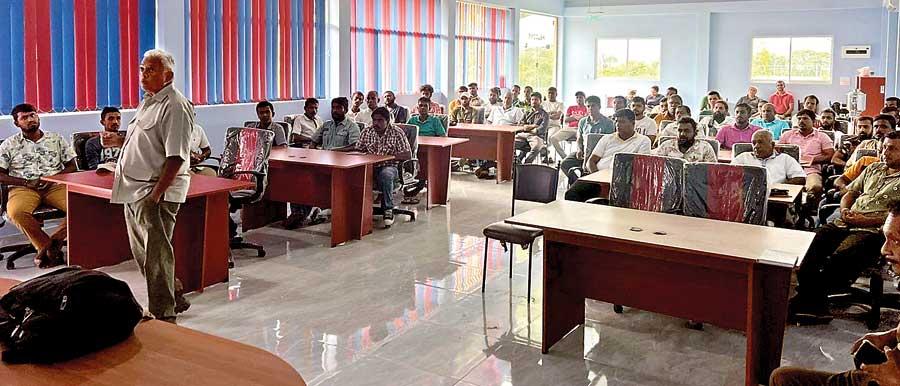13 Nov 2023 - {{hitsCtrl.values.hits}}

Conservationist and senior elephant researcher Dr. Sumith Pilapitiya conducting a session
A visit to Yala National Park is not complete if you don’t spot a leopard. Or that’s how the saying goes. But one doesn’t necessarily have to spot the animal if the jeep drivers could study about the behaviours, breeding patterns and life cycles of its diversity of flora and fauna. This is the highlight of the ongoing Yala Jeep Drivers training programme, initiated by the Wildlife and Nature Protection Society (WNPS) in collaboration with the Department of Wildlife Conservation (DWC) and Sri Lanka Tourism Development Authority (SLTDA).
about the behaviours, breeding patterns and life cycles of its diversity of flora and fauna. This is the highlight of the ongoing Yala Jeep Drivers training programme, initiated by the Wildlife and Nature Protection Society (WNPS) in collaboration with the Department of Wildlife Conservation (DWC) and Sri Lanka Tourism Development Authority (SLTDA).
With the hype created over spotting a leopard at the Yala National Park, a visit to Yala has become more of a trend than a passion. This has prompted more individuals to obtain a permit and become a jeep driver at the Park, a lucrative profession given the demand. Yala Block 1 is often disturbed by a heavy traffic, as every jeep driver tries to surpass one another to provide the best view of almost any animal to the visitors. And this comes at a heavy price.
The roaring engines and reckless driving not only disturbs animals in their natural habitats but presents an unpleasant experience for most visitors. One must bear in mind that we have entered a protected area, home to abundance of flora and fauna and as visitors; it should be our topmost priority to maintain discipline.
The two-day training session is in fact a wholesome learning experience for the drivers. One of the key takeaways in this programme is punctuality. as it is a fundamental element in this disciplining process. Trainings are conducted by leading conservationists, naturalists and environmental experts. The sessions emphasize the importance of maintaining discipline as a driver, why obliging to park rules is important, how every visitor irrespective of their status should obey the rules, how jeep drivers should educate themselves on facts about other flora and fauna, how to narrate interesting stories so that visitors have a pleasant safari experience even if they hadn’t spotted a leopard.
This programme is a good eye opener for the younger generation because sometimes they tend to apply more speed when spotting an animal
- Priyantha Weerasinghe
Thoughts from participants
During the programme, a few participants shared their thoughts with the Daily Mirror;
“A good eye-opener” - Weerasinghe
Priyantha Weerasinghe is a senior safari jeep driver operating at the Yala National Park.“This programme is a good eye opener for the younger generation because sometimes they tend to apply more speed when spotting an animal. Sometimes they tend to skip the queue to get passes quickly and spot the animal before the others. This creates a huge traffic especially at the park entrance. We hope that these issues can be rectified in time to come and when more programmes of this nature are being conducted.”
“Providing a holistic experience for visitors” - Weeraman
Mahesh Weeraman has been working as a naturalist for the past 12 years. He observes that safari drivers should learn more about animals and their behaviours and provide an informative experience to the visitors. “A programme like this is very important for safari jeep drivers as they get a chance to reflect and correct their behaviours while improving their knowledge. We need to provide a holistic experience to the visitors. I’m a naturalist but safari drivers and naturalists don’t share the same kind of knowledge. They would just show an animal. But it would be more interesting to talk about their behaviours, life cycle, breeding patterns etc. Most safari jeep drivers are of the view that it is a must to show a leopard to the visitors. But they can develop a good story even by showing a footprint.”
I’m a naturalist but safari drivers and naturalists don’t share the same kind of knowledge
- Mahesh Weeraman
“An important programme for the younger generation” - Nishantha
K. Sujeewa Nishantha, Wildlife Department Officer in charge of the Katagamuwa Entrance said that most safari jeep drivers weren’t aware of what they should be doing and what they shouldn’t. “But we can put them on the right track if more of these programmes are being conducted. They didn’t know what kind of service they should be providing for the visitors. This programme delivers all these aspects in detail. Jeep drivers should be ready to show every animal that they could spot. Not just leopards.”
Responding to a query on resources allocated to the Wildlife Department, he said that most organisations have come forward to provide the technical expertise. “That support is very important. Operating safari tours is one of the main livelihoods in Tissamaharama. Therefore these kinds of programmes will help the younger generation to improve their knowledge further.”
Jeep drivers should be ready to show every animal that they could spot. Not just leopards
-K. Sujeewa Nishantha
Transforming Yala back into a veritable paradise
“As the organisation responsible for establishing the Yala National Park in the 1930s WNPS has a historical commitment to ensuring the restoration of the park to its former glory,” a spokesperson at WNPS said. “The starting point was to address the biggest issue, the driver discipline and related problems. Three weeks into the training programme with over 300 drivers going through the two-day workshop, we are encouraged and hopeful of a change for the better.”
“However, many jeep drivers shared that the visitors and guides too are part of the problem; often pressurising and inciting the drivers to seek elusive sightings at any cost, regardless of the impact on their surroundings. The drivers therefore urge wildlife enthusiasts, photographers, guides and tourists to support them as they embark on their journey with a renewed purpose: to transform Yala National Park back into a veritable paradise loved by all.”
“As the next step, the WNPS would be having sessions with the Yala Hotels Owners Association, the tour operators and guides, the naturalists attached to the properties in Yala and the photographers on their roles in bringing about a long-term solution.”
02 Jan 2025 7 hours ago
02 Jan 2025 8 hours ago
02 Jan 2025 9 hours ago
02 Jan 2025 02 Jan 2025